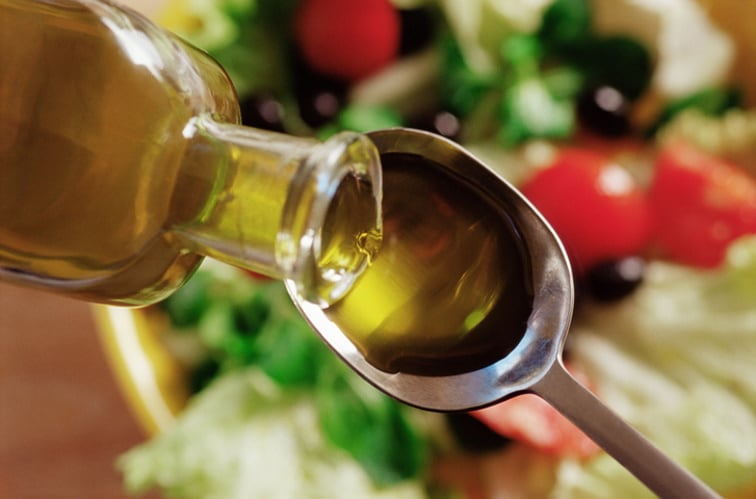Consuming more than half a tablespoon of olive oil per day is associated with lower risk of cardiovascular disease mortality, cancer mortality, neurodegenerative disease mortality and respiratory disease mortality, according to a study publishing in the Journal of the American College of Cardiology.
The study found that replacing about 10 grams/day of margarine, butter, mayonnaise and dairy fat with the equivalent amount of olive oil is associated with lower risk of mortality as well.
Researchers analyzed the diets of around 90,000 health workers over the course of nearly 30 years. They had no heart disease or cancer when the study began in 1990, and completed questionnaires every four years for 28 years of follow-up.
The study found that those consuming the most olive oil, either in salad dressings, added to food or bread, or used for baking and frying at home, were less likely to die from a number of causes.
The study is observational and therefore cannot prove that the levels of olive oil caused the lower death figures.
Participants with higher olive oil consumption were often more physically active were less likely to smoke and had a greater consumption of fruits and vegetables compared to those with lower olive oil consumption, for example.
However, it’s believed that olive oil’s anti-inflammatory and antioxidant properties might have played a role.
“Our findings support current dietary recommendations to increase the intake of olive oil and other unsaturated vegetable oils,” said Marta Guasch-Ferré, PhD, a senior research scientist at the Department of Nutrition at Harvard T.H. Chan School of Public Health and the study’s lead author. “Clinicians should be counseling patients to replace certain fats, such as margarine and butter, with olive oil to improve their health. Our study helps make more specific recommendations that will be easier for patients to understand and hopefully implement into their diets.”
When researchers compared those who rarely or never consumed olive oil, those in the highest consumption category had 19% lower risk of cardiovascular mortality, 17% lower risk of cancer mortality, 29% lower risk of neurodegenerative mortality and 18% lower risk of respiratory mortality. The study also found substituting 10 grams/day of other fats, such as margarine, butter, mayonnaise and dairy fat, with olive oil was associated with 8-34% lower risk of total and cause-specific mortality. They found no significant associations when substituting olive oil for other vegetable oils.
“It’s possible that higher olive oil consumption is a marker of an overall healthier diet and higher socioeconomic status. However, even after adjusting for these and other social economic status factors, our results remained largely the same,” Guasch-Ferré said. “Our study cohort was predominantly a non-Hispanic white population of health professionals, which should minimize potentially confounding socioeconomic factors, but may limit generalizability as this population may be more likely to lead a healthy lifestyle.”
In an accompanying editorial, Susanna C. Larsson, PhD, associate professor of epidemiology at the Karolinska Institutet in Stockholm, said, “The current study and previous studies have found that consumption of olive oil may have health benefits. However, several questions remain. Are the associations causal or spurious? Is olive oil consumption protective for certain cardiovascular diseases, such as stroke and atrial fibrillation, only or also for other major diseases and causes of death? What is the amount of olive oil required for a protective effect? More research is needed to address these questions.”
Reference
Higher olive oil intake associated with lower risk of CVD mortality
Journal of the American College of Cardiology
DOI: 10.1016/j.jacc.2021.10.041




